So, after discussing visual rhetoric in class, I went to find some more examples that I could dissect.
Here’s the first one:
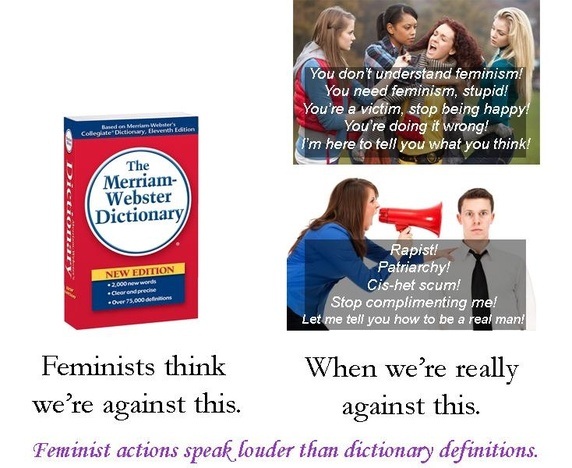
I thought this one was very powerful because I think this was my problem with feminism before I started researching more conversations. Even though I knew the dictionary definition advocated for equality, the instances of which I have seen feminism preached did not really reflect that at all, making me feel like I did not want to associate myself with this. The dictionary represents an idea of a neutral, harmless idea that is perhaps a romanticized, utopian version that has not yet been reached, and may never be reached. I think the image in the top right corner is very effective, caption aside, because I know first hand girls are vicious and don’t do a very good job of “sticking together” and “supporting their sisters of womenhood.” A lot of women become very vocal about criticizing others to elevate your own status, which has been a habit that has sadly turned into a culture. The bottom right image is also effective for two reasons: 1) the megaphone is an effective symbol for overcompensating that women need to be heard 2) the man’s blank face, as if he has been stripped of all capability/agency once the woman has gained her own. I think these are very powerful, realistic, and identifiable images/themes, and that concerns me. I think a lot of the true feminists are soft-spoken and don’t really voice their opinions because they have surrounded themselves with people who respect them regardless of their gender. That leaves other rash women speaking on their behalf and blemishing the name of feminism. Does this mean that feminists have a right to put a muzzle on women giving the rest of them a bad name? Or does feminism mean they have to respect those views too, unable to stop that behavior? How would one revoke the right to preach feminism?
The relation back to the dictionary also makes me think of how the Bible and other holy scriptures are appropriated and taken out of context, and how the actions of a minority suddenly turn the entire concept sour. A friend of mine said religion is bad because it’s used as a shield to gain your own agendas, in the context of the Crusades, and it appalled me, because I happen to think religion is beautiful, peaceful, and spiritual (though I don’t belong to a sect of organized religion).
I feel like this graphic is really simple, but it struck a lot of deep questions that I was grappling with at the beginning (and perhaps still am).
Second Image:
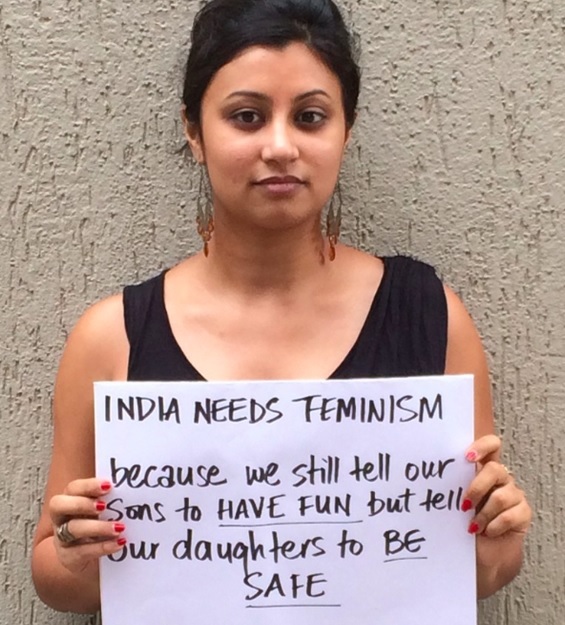
I grabbed this one mainly for the rhetoric. I found the dichotomy of what people tell their sons and daughters very interesting. I think another reason why I was never big on feminism is because my Dad raised me very similarly to how he would raise a boy – he picked on me, he teased me, he challenged me, he never let me win (easily, at least), he told me crude jokes. He’s also the one who taught me how to braid hair, paint my nails, sew by hand, crochet, or with a sewing machine, and bought me my first make-up set, because my Mom didn’t do anything remotely feminine like that. So I think having a parent who embraced both gender roles (I did mixed martial arts for five years and practiced with him, but he hated sports, unlike most stereotypical white fathers, and he watched Disney movies with me instead), and encouraged me to embrace both really made me a balanced individual who feels comfortable in both masculine and feminine environments. But I’ve noticed lately that he’s focusing more on me being safe and watching my surroundings, and buying me stealth weapons, training me on what to do in case I’m stopped, and I wonder if he would teach his son that. Of course, he grew up on Detroit, so he probably would to some extent, but perhaps he’d be less worried for a son. The saying on the picture breeds irresponsibility in sons, and has girls bearing the consequences. It’s also like that saying, “A father is someone who wants his son to grow up just like him, and fear his daughter will meet someone who has.” There’s this double standard that exists in parenting, much more important than what color your child wears (my parents dressed me in blue and red and I was confused for a boy the first year of my life, until they finally gave in to pink) or what toys they play with. It’s the rhetoric you raise your child with, and I think this picture highlights that.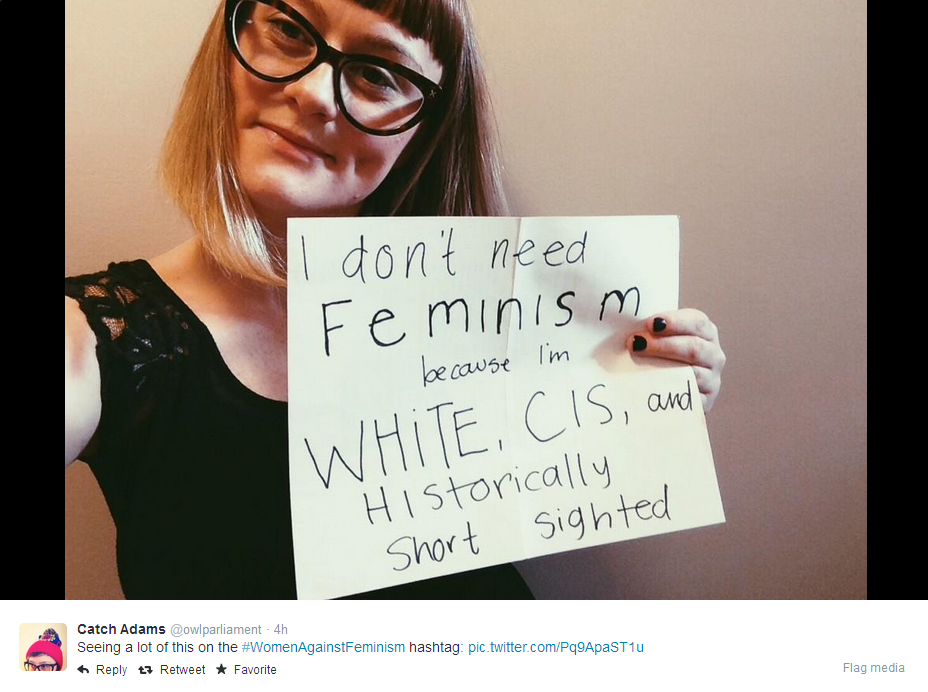
I think the above post is both truthful and degrading. It’s truthful because I don’t see a lot of women of color saying they don’t need feminism, and I think your belief in feminism has to do with privilege. Those closer to the glass ceiling take it for granted, but I don’t think they’re necessarily saying other people don’t need it. Or maybe they are and they’re ignorant of what other women are going through. I think the historically short sighted part rings true because feminism has done so much for women in the past hundred years, and it’s sad we don’t acknowledge that. But I also think this post is degrading because of the following one: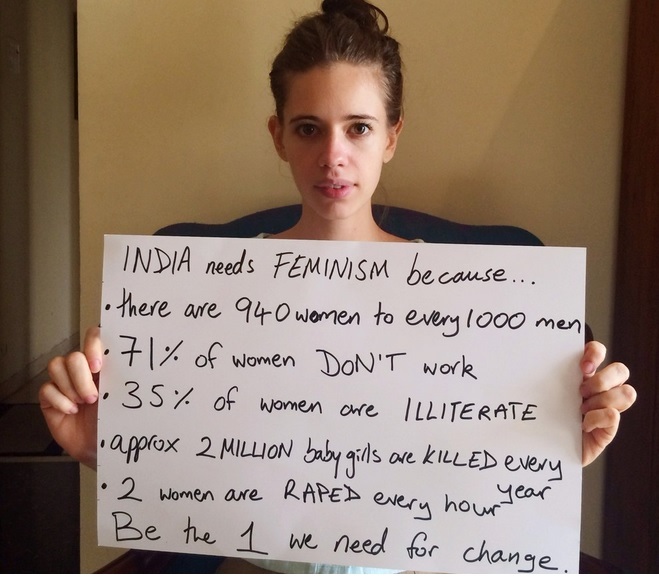
What first struck me about this post is that the woman isn’t saying SHE doesn’t need feminism, she’s saying other people need it more. And I think that’s what’s wrong with the Women Against Feminism rhetoric. 1) They’re speaking only about a small minority of loudmouth feminists who don’t preach actual principles of feminism 2) They don’t recognize other populations’ need for feminism. I also identify with this because I didn’t feel right calling myself a feminist when I wasn’t actively fighting for women’s rights, when I know there are so many women out there who need all types of aid. So I really liked how this subtly elucidated this concept of almost a relative feminism. Some people need it more than others, but all people need it.
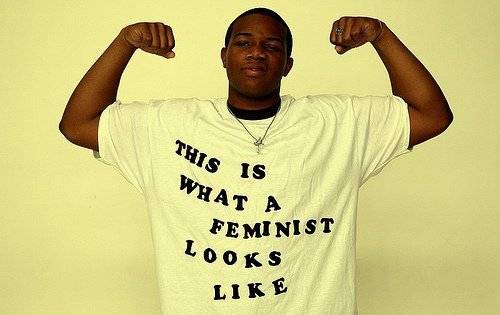
I love this last image so much. I think I like it mainly for it’s simplicity, but it’s also a great visual. I not only like that he’s a man of color, but that he’s flexing as well. It sends the message that being a feminist does not decrease your masculinity at all, which is a message that needs to be sent. Of course, it seems like it, when women mistreat men, but that frustrates me because people in general are jerks, both men and women, probably equally so, but in different ways. I don’t think there is ever going to be true equality because of all the hate that circulates the world, and the various perpetrators who fan the flames, but this picture warmed my heart more than all the other try-hard rhetoric I’ve found supporting women’s rights.
